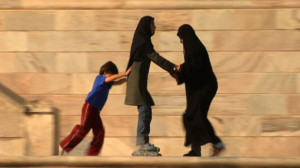Back in the United States, Shapiro worked to convince Iranian officials that they should release the footage to her. For three months, she was regularly on the phone to Iran’s Culture Ministry from her home in Berkeley. And she’d begin each conversation with diplomatic pleasantries, even though she was under tremendous stress, didn’t know what to tell her film’s funders, and at one point was admitted to a hospital with stroke-like symptoms.
“Every phone call (with the Culture Ministry) started with, ‘How are you? How is your family’,” Shapiro says. “I knew I could appeal to their conscience. I knew I had nothing in those tapes that was anti-Islamic or anti-government, which are the two criteria that would give them reason not to return the tapes to me. I was not being funded by the State Department, or part of a big news conglomerate. I understood that the only way I would get my tapes back was that if they understood that this (project) was just me, Justine, with my kid, that I had worked so hard to do. I asked them to watch the tapes. And that they take care of them.”
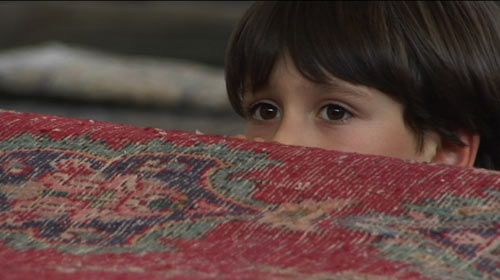
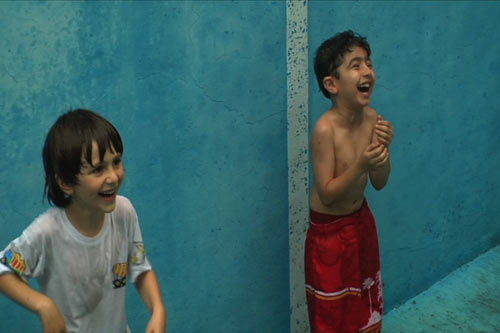
Finally, Iran relented — with huge caveats: Shapiro could get back the footage but she’d have to come to Iran, and she’d have to edit the film there, under the nose of Iran’s Intelligence Ministry. With little choice, that’s what Shapiro did, after picking an Iranian editor, Mostafa Kherghehpoush, who has worked on many of Iran’s most acclaimed movies, including Leila, Two Women, and Turtles Can Fly. Shapiro flew to Iran three times in 2008 to edit Our Summer in Tehran, leaving Mateo behind.
“Each time I met with an official from Iran’s Intelligence Ministry — the same guy who had been interrogating my crew during the summer — he became my assigned official,” says Shapiro. “He’d come into the edit suite, and we’d show him cuts. He didn’t speak a word of English. Mostafa had to translate everything. He (the official) was a little perplexed. He said, ‘Your film is really boring. You need action.’ I said, ‘I know. It’s practically propaganda for you guys. I don’t know why you’re making it so difficult for me. I shouldn’t be here. I should be with my son.’ His concern was that I was going to make a dark picture of Iran. He said, ‘You can go home and cover this with voiceover and re-edit it.’ I said, ‘Of course I can. But do I look like the kind of person who would give up time with my son so I can make a dark picture of Iran? There are enough people making dark pictures of Iran. I’m doing something different. Don’t give me a reason to go home and make a bid deal of this to the press. I understand you’re doing your job, and that I’m a small pawn in this big sea of conflict.'”
During Shapiro’s third visit, she convinced the Intelligence Ministry official that Iran had little reason to continue confiscating the work.
“He looked at me and bowed his head and smiled and said, ‘It’s good. You can take it home,’ pointing to the hard drives and the box of tapes,” says Shapiro. “He said, ‘You go to airport, no problem.’ I took out my notebook and said, ‘I want your cell phone number, so when I’m at the airport and there’s a problem, I can contact you.’ He smiled and gave me his number. It’s 2 a.m. at this point. And they (the official and Mostafa Kherghehpoush) talked. And Mostafa told me, ‘The only condition is that I have to give him a copy of the film for his boss.’ So that was the end of that phase of the drama.”
Our Summer in Tehran screens Thursday, February 17, 7pm at the Saul Zaentz Media Center in Berkeley. In April, the movie is scheduled to be broadcast on PBS stations around the country. This version of the documentary is not the version that Shapiro finished with Kherghehpoush. That version, which was completed after Shapiro returned to the United States (Kherghehpoush flew here twice to continuing editing it), was a more impressionistic and poetic look at Shapiro and her son’s visit to Iran. It had no narration. Shapiro subsequently re-edited the film with the help of an Iranian-American editor, and the new movie has a more straightforward approach, centered this time around Shapiro’s narration.
Shapiro has put many of the difficulties of making Our Summer in Tehran behind her. For much of 2010, she and Mateo lived in Mexico, so Mateo could be close to Shapiro’s ex-husband, Mexican filmmaker Carlos Bolado Munoz, and learn more Spanish. But now, as Our Summer in Tehran has different public screenings and is set for national broadcast, Shapiro is beginning to talk publicly about the film’s problematic back story — and all the beautiful things she encountered in Iran.

The film shows the deep connection that Shapiro made with one mother in particular, Marjan Torabi, the wife of a doctor who works for Iran’s Revolutionary Guards. Mateo was befriended by Iranians who treated him like he was their own child. That was the original intent of the film: To show everyday Iranians doing everyday things, like hanging out with children and eating at home. The goal was to humanize Iranians — to show Americans a people who at the time she envisioned the film (the second half of George W. Bush’s administration), U.S. leaders were talking of bombing. There is still that talk. And there is still the need to show an Iran beyond the typical media template of oil, war, violent Islam, and Middle East politics. That’s what Our Summer in Tehran does without ignoring the historic political tensions between Tehran and Washington. The events of 9/11 helped lay the foundation for Our Summer in Tehran. So did Mateo’s birth six months before 9/11.
“I wanted to make a series of films about how kids were raised in different countries, and the series was provisionally titled ‘Global Moms,’ ” says Shapiro. “The first iteration of that film was ‘Mateo Meets Mohammed.’ Mateo and I were going to live with Muslim families around the world, and I wrote a very in-depth proposal and treatment for the National Endowment for the Humanities, and submitted it to other foundations. There was no interest. People thought it was impossible and dangerous. . . . As a new mother, I realized that the way I was raising Mateo said a lot about who I was and about my values, and what societal values were. I thought it was an interesting prism through which to get a sense of a culture. What are parents modeling to their kids? We hear a lot about politics, but we don’t see a lot of the day-to-day around the world.”
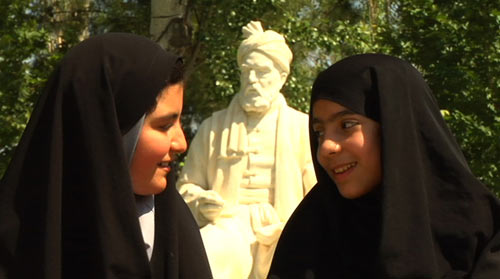
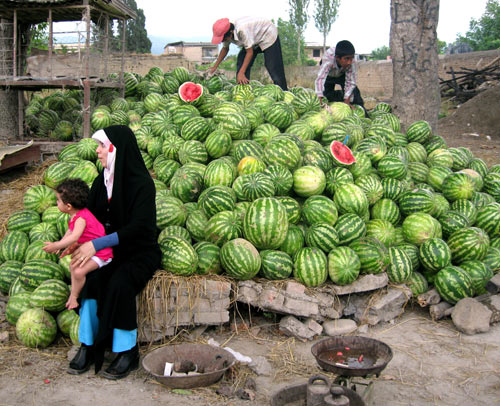
“I started to raise money for the ‘Global Moms’ project, and I thought, ‘Maybe the safest first country to choose would be China,” Shapiro continues. “It’s an important country for us to understand. But while I was researching China, I was hearing more and more in the news about there being a possibility of war with Iran. I thought, ‘We should go to Iran. That’s what we need to understand right now.’ “
A key scene in the film shows Shapiro revealing the fact that she’s Jewish to Marjan Torabi. It comes as the two are about to enter one of Iran’s holiest Shiite shrines, in Mashad. Friends warned Shapiro before going to Iran that she should hide her religion. Shapiro was born in South Africa, and her father lived in Israel, where he was in the military. Mahmoud Ahmadinejad, Iran’s president, and other Iranian leaders have openly professed their enmity for Israel. But these are the words that Shapiro hears immediately from Torabi: “It’s OK. No problem.”
Our Summer in Tehran is full of surprising insight — into Iran, into Shapiro and Mateo. At one point, the film shows Torabi’s 11-year-old daughter, Elaheh, doing what young girls do around the world: Playing with blonde Barbies. Torabi’s daughter has her hair covered in the style of a religiously observant Iranian woman. The Barbie is uncovered, dressed in what could be called a “secular style.” This intersection of cultures, in the bedroom of a pious (and articulate) Iranian girl, is the kind of image that hasn’t really been seen in previous U.S. documentaries. And it’s why Shapiro was so astounded that the Iranian authorities had been so difficult with her.
“This very simple film,” says Shapiro, “was born of very extraordinary logistical machinations.”

